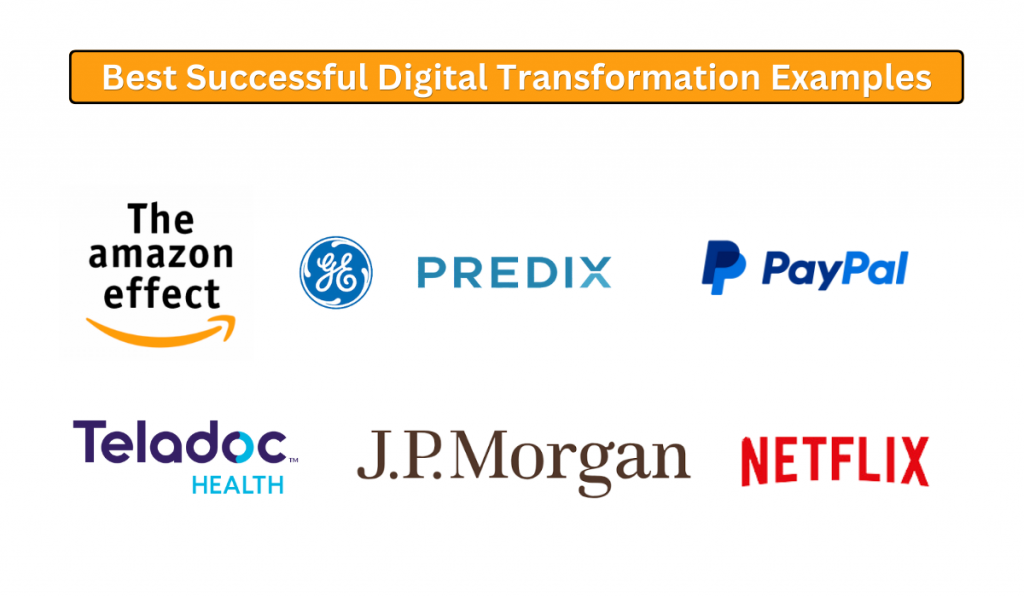Digital transformation is reshaping the business landscape at an unprecedented pace, turning traditional models on their heads and introducing new ways of delivering value. In a world where adapting to change is not just beneficial but essential, examining successful digital transformation projects offers invaluable insights.
A recent study by the International Data Corporation (IDC) forecasts that global spending on digital transformation technologies and services will reach $23.9 trillion in 2027, emphasizing the massive scale and investment in this area IDC, 2020.
According to a report by zdnet, 70% of companies either have a digital transformation strategy in place or are working on one, highlighting the critical role of digital innovation in today’s business strategies.
With these examples, we aim to not only inform but inspire you to consider how digital transformation can benefit your own business or industry.
- Why Digital Transformation is Important for Business?
- What is the Role of Digital Transformation in Everyday Life?
- 7 Best Real-World Digital Transformation Examples
- 1) Digital Transformation in Retail: The Amazon Effect
- 2) Banking Reimagined: JPMorgan Chase’s Digital Makeover
- 3) Healthcare Revolution: Telemedicine by Teladoc Health
- 4) Manufacturing Innovation: General Electric’s Predix Platform
- 5) The Rise of Digital Payments: PayPal’s Evolution
- 6) Transforming Entertainment: Netflix’s Streaming Revolution
- 7) Smart Cities: Singapore’s Digital Transformation
- Final Words
- Related FAQs
Why Digital Transformation is Important for Business?

In the rapidly evolving digital economy, businesses cannot afford to remain stagnant. Digital transformation is no longer an option but a necessity for survival and growth. This process goes beyond merely adopting new technologies; it involves a fundamental change in how a company operates and delivers value to its customers. The importance of digital transformation can be seen in its ability to streamline operations, enhance customer experiences, and foster innovation.
A notable statistic underscoring the importance of digital transformation comes from a 2023 study, which found that companies that have undergone digital transformation report a 45% increase in revenue growth compared to their counterparts. This significant impact highlights how digital adoption can drive financial performance and competitive advantage.
The role of digital transformation extends beyond internal efficiencies. It’s pivotal in meeting the changing expectations of modern consumers who demand seamless, personalized experiences across all channels. Businesses that excel in delivering these experiences not only retain a loyal customer base but also attract new customers through superior service.
Moreover, digital transformation paves the way for innovation by providing businesses with the tools and data necessary to explore new business models and services. In a landscape where disruption is the new norm, the ability to innovate quickly is a crucial determinant of long-term success.
Ready to implement? Best Digital Transformation Companies in 2025
What is the Role of Digital Transformation in Everyday Life?

Digital transformation transcends the boundaries of business and industry, weaving into the very fabric of everyday life and altering how we communicate, work, and entertain ourselves. It’s at the heart of the conveniences we’ve come to rely on and value. From the way we shop online to how we manage our health, digital transformation is making its mark by enhancing accessibility, personalization, and efficiency.
One compelling example of digital transformation’s role in daily life is the surge in telehealth services.
As of 2023, over 60% of healthcare consumers in the United States have reported using telehealth services, compared to just 25% in 2019, demonstrating a significant shift in how healthcare is accessed and delivered.
This leap not only highlights the demand for digital health solutions but also underscores the ability of digital transformation to make healthcare more accessible and convenient.
Moreover, digital transformation has revolutionized the retail sector. E-commerce platforms, powered by AI and machine learning algorithms, offer personalized shopping experiences, recommending products based on individual preferences and past shopping behavior. This level of customization was unimaginable a decade ago but is now expected by consumers.
In education, digital transformation has broken down geographical and financial barriers. Online learning platforms provide access to high-quality education from anywhere in the world. The rise of Massive Open Online Courses (MOOCs) and digital certifications has democratized learning, enabling lifelong education and skill development outside traditional classroom settings.
Digital transformation also plays a pivotal role in how we interact socially. Social media platforms, instant messaging, and video calls have transformed communication, making it more immediate and accessible than ever before. These platforms have become essential for maintaining personal and professional relationships, showcasing the social dimension of digital transformation.
As we delve into specific examples of successful digital transformation projects in businesses, it’s crucial to recognize that these advancements also significantly influence and enhance our everyday lives. By making services more accessible, enhancing communication, and personalizing experiences, digital transformation enriches the fabric of our daily existence.
Thinking “How to Find the Best Digital Transformation Partner in 2025?“
7 Best Real-World Digital Transformation Examples

1) Digital Transformation in Retail: The Amazon Effect
In the realm of retail, Amazon stands as a colossus, epitomizing the power and potential of digital transformation. Starting as a humble online bookstore, Amazon has morphed into a global e-commerce behemoth that not only sells virtually everything but also has set new standards for customer service, logistics, and innovation. This transformation has profoundly influenced consumer expectations and competitors’ strategies worldwide.
A testament to Amazon’s influence is its pioneering of one-day shipping, which has set a new benchmark for delivery speed and efficiency. In 2023, Amazon reported that over 7 billion items were delivered through its Prime service, showcasing the massive scale and efficiency of its logistics network.
This remarkable feat has pressured other retailers to accelerate their own digital transformation efforts to keep pace with evolving consumer demands for speed and convenience.
Amazon’s success lies not just in its technological advancements but in its customer-centric approach. By leveraging big data, artificial intelligence, and machine learning, Amazon offers personalized shopping experiences, recommending products based on browsing and purchase history. This level of personalization enhances customer satisfaction and loyalty, driving repeat business.
Moreover, Amazon’s foray into physical retail with the acquisition of Whole Foods and the launch of Amazon Go stores demonstrates its understanding that digital transformation encompasses blending digital and physical experiences seamlessly. These initiatives highlight Amazon’s ongoing commitment to redefining the retail landscape.
Amazon’s digital transformation journey illustrates a key lesson for businesses: success in the digital age requires a relentless focus on innovation, customer experience, and operational efficiency. By observing Amazon’s strategies and achievements, businesses in all sectors can glean insights into driving their own digital transformations.
If you are looking for? Digital Transformation Companies in United Kingdom
2) Banking Reimagined: JPMorgan Chase’s Digital Makeover
In the fast-evolving landscape of financial services, JPMorgan Chase has distinguished itself as a frontrunner in digital transformation. Recognizing the shifting consumer preferences towards online and mobile banking, JPMorgan Chase has invested heavily in technology to reimagine banking for the digital age, making it more accessible, convenient, and secure for its customers.
A striking illustration of JPMorgan Chase’s commitment to digital innovation is its mobile banking app, which has been rated as one of the best in the industry.
As of 2023, the bank reported that over 50 million customers actively use its digital banking platforms, a clear indication of the app’s success and the growing consumer reliance on digital banking solutions.
This digital transformation extends beyond consumer banking. JPMorgan Chase has leveraged artificial intelligence and blockchain technology to streamline operations and enhance security. Its use of AI in fraud detection has notably reduced false positives, improving customer experience and trust. Meanwhile, its exploration of blockchain for secure and efficient transaction processing is setting new standards in the financial industry.
Moreover, JPMorgan Chase’s digital transformation strategy includes a focus on personalized customer experiences. By analyzing data on customer behavior and preferences, the bank offers customized financial advice and product recommendations, further cementing its role as a trusted advisor in its customers’ financial lives.
JPMorgan Chase’s digital makeover is not just about adopting new technologies; it’s about transforming the culture and operations to be more agile, innovative, and customer-focused. This comprehensive approach to digital transformation has positioned JPMorgan Chase as a leader in the digital banking revolution, illustrating the profound impact of digital initiatives on the financial services industry.
Related: The Role of Software in Digital Transformation for Small Businesses.
3) Healthcare Revolution: Telemedicine by Teladoc Health
The healthcare industry has been profoundly transformed by digital technologies, making significant strides in improving access, efficiency, and patient outcomes. A standout example of this digital revolution is Teladoc Health, a leader in telemedicine that has leveraged digital platforms to deliver healthcare services remotely, dramatically changing the patient and provider experience.
Telemedicine, once a niche service, has become mainstream, thanks in part to companies like Teladoc Health. By offering consultations via phone, video, or app, Teladoc has made medical care more accessible, especially in underserved areas or for individuals with mobility challenges.
In 2025, Teladoc Health reported over 50 million virtual visits, showcasing the growing acceptance and demand for telehealth services.
The benefits of telemedicine are manifold. For patients, it means reduced waiting times, increased access to specialists, and the convenience of receiving care from the comfort of their homes. For healthcare providers, it offers a way to optimize their schedules, extend their reach, and better manage patient follow-ups, ultimately leading to improved health outcomes.
Teladoc Health’s success can be attributed to its robust technology platform, which ensures privacy, security, and ease of use for both patients and doctors. The platform’s capability to integrate with electronic health records (EHRs) and other health systems enhances continuity of care and supports more informed decision-making by healthcare professionals.
Moreover, Teladoc’s services extend beyond individual consultations to include mental health services, chronic disease management, and health advisories, reflecting the comprehensive potential of digital transformation in healthcare. By addressing a wide range of healthcare needs through technology, Teladoc Health exemplifies how digital transformation can lead to more holistic and patient-centered care.
The case of Teladoc Health underscores the critical role of digital transformation in healthcare, highlighting how technology can bridge gaps in access, improve patient experiences, and foster a more efficient and effective healthcare ecosystem.
If you are an aspiring entreprenur and want digital transformation of your business, you may reach out to top digital transformation companies.
4) Manufacturing Innovation: General Electric’s Predix Platform
The manufacturing industry, often characterized by its heavy reliance on physical processes and equipment, has seen a significant shift towards digitalization. General Electric (GE), a multinational conglomerate, has been at the forefront of this transformation, particularly through its Predix platform. Predix embodies the essence of the Industrial Internet of Things (IIoT), providing a cloud-based platform that allows for the collection and analysis of data across machines and equipment.
General Electric’s Predix platform is designed to optimize industrial operations, improve efficiency, and reduce downtime through predictive maintenance. By analyzing data from sensors on industrial equipment, Predix can predict potential failures before they occur, allowing for preventative maintenance and reducing costly unplanned downtime. This capability is a game-changer in the manufacturing sector, where equipment failure can result in significant financial losses and safety risks.
GE reported that its Predix platform had helped customers save over $1 billion by improving operational efficiency and reducing maintenance costs.
This statistic highlights the tangible benefits of digital transformation in manufacturing, demonstrating how data analytics and IIoT can lead to significant cost savings and efficiency gains.
Beyond predictive maintenance, the Predix platform facilitates the development of new industrial applications, offering tools for developers to build custom solutions that address specific operational challenges. This flexibility and scalability make it a powerful tool for driving innovation in manufacturing processes and products.
GE’s implementation of the Predix platform underscores the transformative potential of digital technology in manufacturing. By harnessing the power of data and connectivity, GE is not only enhancing its own operations but also paving the way for the future of the industry. The success of Predix exemplifies how digital transformation can lead to smarter, more efficient manufacturing practices that adapt to the demands of the modern economy.
If you are worried about how to improve digital customer experience, read our guide.
5) The Rise of Digital Payments: PayPal’s Evolution
PayPal’s story is a testament to the transformative power of digital technology in the financial sector. Launched in the late 1990s as a simple solution for peer-to-peer payments, PayPal has evolved into a comprehensive digital payments platform, facilitating transactions for millions of individuals and businesses around the world. Its success is indicative of the shift towards digital payments, a trend that has accelerated in recent years.
A key statistic highlighting PayPal’s impact is the volume of payments processed through its platform.
In 2023, PayPal reported handling over $1.5 trillion in total payment volume, a milestone that underscores the widespread adoption and trust in digital payment solutions.
This achievement reflects not only PayPal’s growth but also the broader movement towards a cashless society.
PayPal’s evolution includes expanding its services beyond simple transactions. The company now offers a suite of financial services, including credit options, money transfers, and business financing solutions. This expansion has been fueled by strategic acquisitions and partnerships, allowing PayPal to integrate with various ecommerce platforms and financial institutions, thereby enhancing its ecosystem.
One of the critical factors in PayPal’s success has been its focus on security and user trust. By implementing advanced encryption and fraud detection technologies, PayPal has managed to mitigate the risks associated with online transactions, making digital payments safer and more reliable for users worldwide.
Moreover, PayPal has been a pioneer in adapting to new payment technologies, including mobile payments and cryptocurrency transactions. This adaptability demonstrates PayPal’s commitment to innovation and its role in shaping the future of digital payments.
The story of PayPal exemplifies how digital transformation can revolutionize an industry, offering insights into the importance of innovation, adaptability, and user trust in driving success in the digital age.
Must read: Best App Marketing Companies
6) Transforming Entertainment: Netflix’s Streaming Revolution
Netflix’s evolution from a DVD rental service to the world’s leading streaming platform is a classic example of digital transformation in the entertainment sector. By harnessing the power of the internet and advancements in streaming technology, Netflix has fundamentally changed how people access and enjoy movies and television shows.
A pivotal statistic that illustrates Netflix’s impact is its subscriber base.
As of 2023, Netflix boasts over 260 million subscribers globally, a testament to the platform’s immense popularity and the growing preference for streaming services over traditional television and movie viewing methods.
The key to Netflix’s success lies in its user-centric approach. By investing heavily in a robust content library that includes original productions, Netflix caters to a wide range of tastes and preferences. The platform’s recommendation algorithm, which suggests content based on viewing history, further personalizes the user experience, making it more engaging and enjoyable.
Moreover, Netflix’s streaming revolution has spurred significant changes in the entertainment industry, prompting media companies to accelerate their digital transformation efforts. The rise of streaming services has led to increased competition, pushing content creators to innovate and diversify their offerings.
Netflix’s commitment to innovation is also evident in its approach to content delivery. The company has developed sophisticated technology to ensure high-quality streaming experiences across various devices and internet speeds, addressing one of the primary challenges of online video consumption.
The Netflix story underscores the transformative potential of digital technologies in redefining industries. It highlights how a focus on customer experience, combined with strategic investment in technology and content, can create a successful digital enterprise that sets new standards for the entire industry.
7) Smart Cities: Singapore’s Digital Transformation
Singapore’s journey to becoming a smart city is a testament to the transformative power of digital technology in urban management and development. Recognized globally for its innovative approach to addressing urban challenges, Singapore leverages digital transformation to enhance the quality of life for its residents, optimize resource management, and ensure sustainable urban growth.
A pivotal aspect of Singapore’s smart city initiatives is its Smart Nation program, aiming to harness ICT, networks, and data to improve living conditions, create more opportunities, and support stronger communities.
One notable statistic illustrating the program’s success is the implementation of over 1,000 sensors and cameras across the city to monitor everything from cleanliness to traffic, significantly improving operational efficiency and public services.
Singapore’s smart city strategy encompasses several key areas, including transportation, healthcare, and public services. In transportation, the introduction of electronic road pricing has helped manage traffic flow, reducing congestion and environmental impact. In healthcare, telemedicine initiatives similar to those of Teladoc Health have been expanded, offering residents access to medical consultations without the need to visit a hospital or clinic.
Another groundbreaking project is the development of virtual Singapore, a dynamic three-dimensional city model and collaborative data platform, including geographical and real-time data to support urban planning, research, and community services. This digital twin of Singapore allows for simulations to optimize urban planning decisions and emergency response strategies.
Singapore’s commitment to digital transformation is also evident in its push for digital literacy and inclusion, ensuring that all segments of the population benefit from technological advancements. Through various programs and initiatives, the government seeks to equip its citizens with the necessary skills to thrive in a digital world.
Singapore’s approach to becoming a smart city illustrates the holistic impact of digital transformation on urban development. By integrating technology into every aspect of city management and development, Singapore not only enhances its operational efficiency and sustainability but also sets a benchmark for cities worldwide aspiring to embrace the digital future.
Also Read: Tips For Improving Your Digital Marketing ROI
Final Words
As we conclude our exploration of the top 7 successful digital transformation projects in business, it’s clear that the impact of these initiatives spans across various industries, from retail and banking to healthcare, manufacturing, digital payments, entertainment, and urban development.
Each example provides a unique insight into how embracing digital technologies can lead to remarkable innovations and efficiencies, fundamentally transforming the way businesses operate and deliver value to their customers.
Related FAQs
Digital transformation is the integration of digital technology into all areas of a business, fundamentally changing how it operates and delivers value to customers. It involves rethinking old operating models, experimenting more, and becoming more agile in the ability to respond to customers and competitors.
Many small businesses have successfully embraced digital transformation by adopting e-commerce platforms, utilizing social media for marketing, implementing customer relationship management (CRM) systems, and using cloud-based tools for collaboration and productivity. These steps have enabled small businesses to expand their reach, improve customer engagement, and operate more efficiently.
The biggest challenges include cultural resistance to change, the complexity of integrating new technologies with existing systems, ensuring data security and privacy, managing the cost of new technology investments, and the ongoing need for employee training and development to keep pace with technological advancements.
An example of digital transformation in India is the Aadhaar project. It’s the world’s largest biometric ID system, linking biometric and demographic data of residents to a unique 12-digit number. This initiative has transformed public services, making them more accessible and efficient by leveraging digital technology.
An everyday example of digitalization is mobile payments. Services like Apple Pay, Google Wallet, and various banking apps allow users to make transactions digitally without physical cash or cards. This convenience has fundamentally changed how people shop, dine, and conduct day-to-day transactions.
Nike’s digital strategy focuses on leveraging online platforms and digital tools to enhance customer experiences and engagement. This includes using its website and apps to offer personalized recommendations, exclusive products, and fitness tracking features. Nike also harnesses social media and digital marketing to connect with its audience more effectively.
Digitalization refers to using digital technologies to convert information or processes into a digital form. In contrast, digital transformation involves a broader rethinking of business strategies, models, and processes through the use of digital technology, aiming for fundamental changes in how a business operates and delivers value.
Netflix’s digital transformation from a DVD rental service to a leading streaming platform allowed it to tap into the global internet user base, offering on-demand access to a vast content library. This shift not only expanded its market but also revolutionized the entertainment industry by introducing a new way of consuming media, leading to significant growth in subscribers and revenue.










Leave a Reply